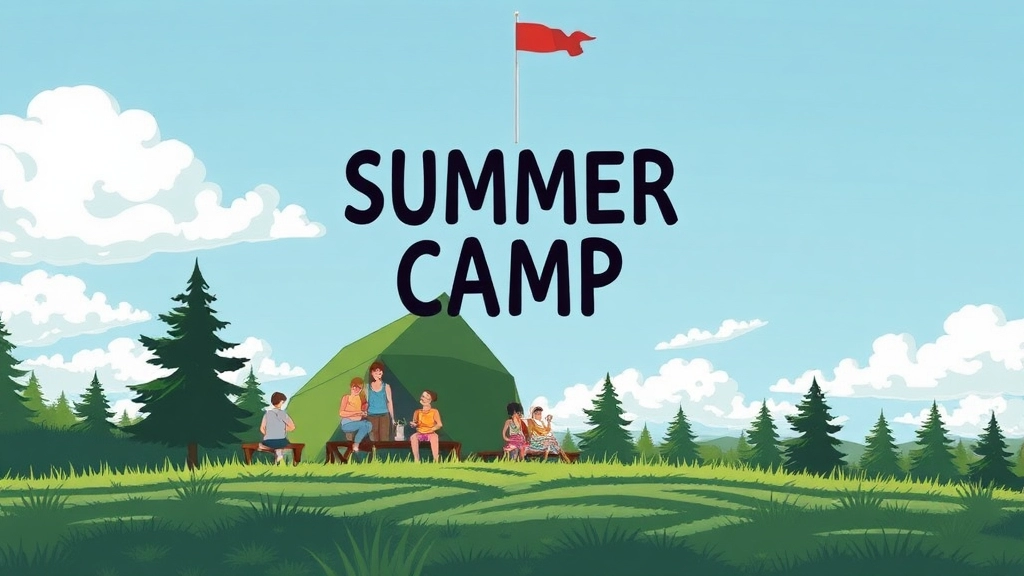Summer Camp Experiences: Myths and Realities
Summer camp experiences are often romanticized by media, leading to a myriad of myths and misconceptions. While movies depict endless fun and drama-filled adventures, the reality is more nuanced. This article delves deep into the myths and realities of summer camp experiences, the influence of media, and the dynamics of adolescent relationships. From understanding consent and boundaries to the pivotal role of camp counselors, we aim to provide a comprehensive guide to navigating the complexities of summer camp life.
Key Topics Addressed
Moreover, we address crucial topics like:
- Sexual Health Education
- Creating a Safe and Respectful Environment
- Legal and Ethical Considerations for Camps
Parental Concerns
Parental concerns are also a focal point, with tips on effective communication with camp staff to ensure a stress-free experience. With real stories and actionable advice, this article serves as a valuable resource for parents and campers alike, ensuring a memorable and safe summer camp adventure.
Exploring the Myths and Realities of Summer Camp Experiences
Summer Camp Myths: What’s True and What’s Not?
Alright, let’s dive right in. When you think of summer camp, what pops into your head? Maybe it’s the picture-perfect scenes from movies, where kids are always having the time of their lives, roasting marshmallows by the campfire, and making lifelong friends. But is that the whole truth? Spoiler alert: not always.
Common Myths About Summer Camps
Let’s bust some myths right off the bat. Here are a few common misconceptions about summer camps:
- Myth 1: Every Day is Sunshine and Rainbows
- Reality: Sure, there are great days, but there are also days when it rains, kids get homesick, or the activities don’t go as planned. It’s not always a highlight reel.
- Myth 2: Summer Camp is Just Like the Movies
- Reality: Camps vary widely. Some are all about sports, others focus on arts, and some are a mix. The experience can be vastly different depending on the camp’s focus and culture.
- Myth 3: Camp Friendships Last Forever
- Reality: While some friendships do stand the test of time, others might fade once camp is over. And that’s okay. It’s all part of growing up.
The Realities of Summer Camp
So, what’s the real deal with summer camps? Let’s break it down:
- Mixed Emotions: Kids might feel a mix of excitement and anxiety. It’s normal to be nervous about being away from home and meeting new people.
- Learning Independence: Camps are a great way for kids to learn self-reliance. They have to manage their own schedules, keep track of their belongings, and sometimes even help with chores.
- Building Resilience: Not everything will go smoothly. There will be challenges, but these experiences help kids build resilience and problem-solving skills.
Personal Stories: The Good, The Bad, and The Ugly
Let me tell you about my friend Jamie. Jamie went to a sports camp expecting to become the next David Beckham. Instead, he found out he hated football but loved archery. Another friend, Lisa, was super homesick for the first few days but ended up making friends she still talks to years later. These stories highlight that camp experiences are unique and varied.
Why Understanding These Realities Matters
Knowing the myths and realities helps set realistic expectations. Parents and kids can better prepare for the camp experience, making it more enjoyable and less stressful. If you’re looking for more tips on how to prepare, check out our guide on [summer camp daily schedule, activities, and safety](https://summercamp.blog/summer-camp-daily-schedule-activities-safety/).
For those interested in the different types of camps and what they offer, our comprehensive [summer camp themes and creative ideas for 2024](https://summercamp.blog/summer-camp-themes-creative-ideas-for-2024/) can be a great resource.
The Influence of Media on Summer Camp Perceptions
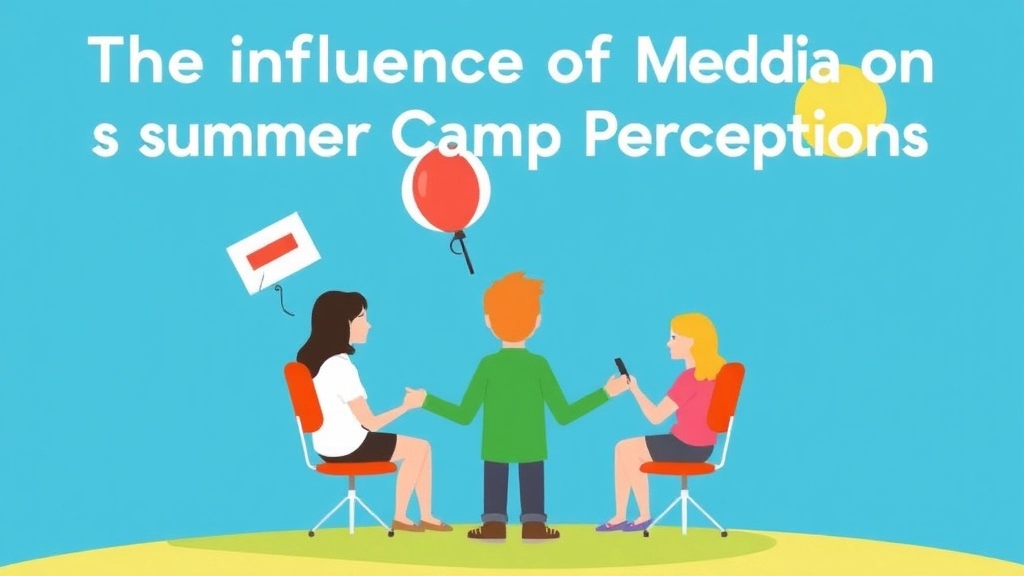
When you think of summer camp, what pops into your head?
Is it the campfire singalongs and marshmallows?
Or maybe the drama-filled adventures seen in movies?
Let’s be real: media shapes our views on summer camps more than we think.
The Hollywood Effect
Movies and TV shows paint a picture of summer camps that’s often far from reality.
They show:
- Over-the-top pranks that would never fly in real life.
- Romantic escapades that make it seem like camp is just a big dating game.
- Unrealistic adventures that can set up false expectations.
This can lead to some serious misconceptions.
Real vs. Reel
In reality, summer camps are about:
- Learning new skills.
- Building friendships.
- Growing as individuals.
Sure, there might be some pranks and crushes, but they’re not the main event.
Media’s Role
Media can:
- Exaggerate the fun and downplay the challenges.
- Create stereotypes about campers and counsellors.
- Make parents worry about safety and supervision.
So, how do we cut through the noise?
Keeping It Real
Here’s what you need to know:
- Talk to real campers and parents.
- Visit the camp beforehand if possible.
- Read reviews and testimonials.
- Ask questions about the daily schedule and activities.
Personal Stories
I remember watching a movie where the camp was a non-stop party.
When I went to camp, I found it was more about teamwork and learning.
The real fun was in the friendships and the new experiences.
Adolescent Relationships at Summer Camps: What’s the Deal?
Alright, let’s be real. Summer camps are a breeding ground for adolescent relationships. You’ve got teenagers away from home, experiencing a new sense of freedom, and naturally, sparks are going to fly. But how do we navigate these relationships in a way that’s healthy and respectful?
Common Concerns and Real Questions
Parents often worry about their kids getting into relationships at camp. Is it safe? Are they too young? Will it distract them from the camp activities? These are valid concerns, and as someone who’s been there, I get it. Let’s break it down and tackle these worries head-on.
Understanding the Dynamics
Adolescent relationships at summer camps are unique. They’re intense, short-lived, and often happen in a bubble. Here’s what you need to know:
- Intensity: Camp relationships can feel like a whirlwind. Teens are in close quarters, sharing experiences, and emotions run high.
- Duration: Most camp relationships are fleeting. They often don’t last beyond the camp session, but they can leave a lasting impact.
- Environment: The camp setting is different from school or home. It’s a controlled environment, but it’s also less structured, which can lead to different social dynamics.
Tips for Navigating Relationships
For both campers and parents, here are some tips to help navigate these adolescent relationships:
- Communication is Key: Encourage open communication between campers and their parents. Teens should feel comfortable discussing their feelings and experiences.
- Set Boundaries: It’s crucial to set clear boundaries. This includes physical boundaries and understanding what’s appropriate in a camp setting.
- Respect and Consent: Teach the importance of respect and consent. Every interaction should be consensual and respectful.
Real Stories and Examples
Let me share a quick story. I remember a camper named Jake who had his first crush at camp. He was nervous and didn’t know how to approach her. With a little guidance from the camp counsellors, he learned to communicate his feelings respectfully. They went on a couple of camp activities together and had a great time. By the end of the camp, they parted ways but remained friends. This experience taught Jake valuable lessons about relationships and respect.
Role of Camp Counselors
Camp counsellors play a pivotal role in guiding these relationships. They’re not just there to supervise but to mentor and support. Here’s how they can help:
- Mediation: Counselors can mediate conflicts and help resolve misunderstandings.
- Education: They can educate campers about healthy relationships and boundaries.
- Support: Providing emotional support and being a listening ear can make a huge difference.
For more insights on summer camp dynamics, check out our guide on summer camp culture, traditions, activities, and growth. Additionally, ensure your kids are well-prepared with our summer camp uniform essentials guide.
Addressing Consent and Boundaries in Camp Settings
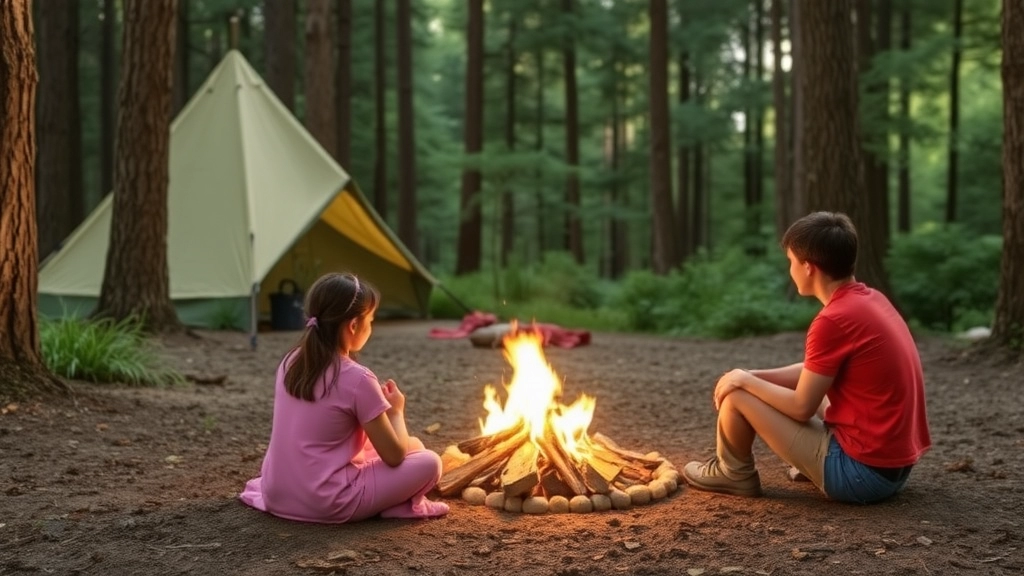
Alright, let’s get real.
How do we talk about consent and boundaries at summer camps?
It’s a big deal, right?
Parents worry.
Campers are unsure.
And camp staff? They’ve got a lot on their plates.
But here’s the thing.
We need to make sure everyone feels safe and respected.
So, let’s break it down.
Why Consent and Boundaries Matter
Consent isn’t just a buzzword.
It’s about respect and understanding.
And boundaries?
They’re the invisible lines that keep everyone comfortable.
At camp, these concepts are crucial.
Why?
Because kids are learning how to interact.
And they need guidance.
How to Talk About Consent
First off, keep it simple.
No need for fancy terms.
- Ask Before Acting: Whether it’s sharing a snack or giving a hug.
- Listen and Respect: If someone says “no,” that’s it. No questions asked.
- Clear Communication: Encourage campers to speak up if they’re uncomfortable.
Setting Boundaries
Boundaries can be tricky.
So, let’s make it easy.
- Personal Space: Everyone has their bubble. Respect it.
- Physical Touch: High-fives? Cool. Hugs? Ask first.
- Privacy: Everyone deserves alone time. Knock before entering cabins.
Role of Camp Counselors
Counselors play a huge role here.
They’re the guides.
The mentors.
They need to model respect and boundaries.
- Lead by Example: Show what consent looks like.
- Open Dialogue: Create a space where campers feel safe to talk.
- Intervene When Needed: If boundaries are crossed, step in.
Real Stories, Real Impact
Imagine this.
A camper feels uncomfortable with a game.
They speak up.
The counselor listens, respects their feelings, and adjusts the activity.
That camper?
They feel heard and valued.
That’s the power of addressing consent and boundaries.
The Role of Camp Counselors in Guiding Healthy Interactions
Alright, let’s cut to the chase. Ever wondered why camp counselors are so crucial in shaping those summer camp experiences? Yeah, me too. Here’s the deal: camp counselors aren’t just there to lead activities or keep an eye on the kids. They play a pivotal role in guiding healthy interactions among campers. So, let’s break it down.
Why Camp Counselors Matter
First off, camp counselors are the backbone of any summer camp. They set the tone, create the vibe, and ensure everyone feels included. But their role goes way beyond just being a friendly face.
- Role Models: Campers look up to them. Whether it’s how they handle conflicts or how they treat others, counselors set the example.
- Mediators: Camps can be a hotbed for drama, especially with adolescents. Counselors step in to mediate and resolve issues before they escalate.
- Educators: They teach campers about respect, consent, and boundaries. These aren’t just buzzwords; they’re essential life skills.
Guiding Healthy Interactions: What Does It Look Like?
So, what does guiding healthy interactions actually involve? Let’s keep it real and practical.
- Setting Clear Expectations:
- Ground Rules: From day one, counselors lay down the law. No bullying, no exclusion, and absolutely no disrespect.
- Lead by Example: They walk the talk. If they expect campers to be kind and respectful, they show kindness and respect in their own actions.
- Creating Safe Spaces:
- Open Communication: Counselors encourage campers to speak up. Got a problem? Talk about it. Feeling left out? Let’s fix it.
- Non-Judgmental Environment: No one’s perfect. Counselors make sure campers know it’s okay to make mistakes and learn from them.
- Conflict Resolution:
- Active Listening: Counselors listen to all sides of a story before making a judgment. It’s not about taking sides; it’s about finding solutions.
- Problem-Solving Skills: They teach campers how to resolve conflicts on their own. Think of it as equipping them with tools for life.
Real Talk: Stories from the Field
Let me share a story to bring this home. Last summer, we had a camper named Jake who was having a tough time fitting in. He felt isolated and was on the verge of quitting camp. Our counselor, Sarah, noticed this and took him under her wing. She introduced him to a group of kids with similar interests and made sure he felt included in activities. By the end of the summer, Jake was a different kidâmore confident, more social, and genuinely happy. That’s the power of a good counselor.
The Ripple Effect
When camp counselors guide healthy interactions, the benefits are massive:
- Stronger Friendships: Campers build genuine, lasting friendships.
- Better Communication Skills: They learn how to express themselves and listen to others.
- Increased Self-Esteem: Feeling respected and included boosts their confidence.
Wrapping It Up
So, the next time you think about summer camps, remember that counselors are the unsung heroes. They’re not just there to supervise; they’re there to guide, support, and shape young lives. And trust me, the impact they have is nothing short of life-changing.
Got more questions about how camp counselors can make or break your kid’s summer? Dive into our other sections on Navigating Adolescent Relationships at Summer Camps and Creating a Safe and Respectful Environment for Campers. You’ll find all the insights you need to ensure a positive camp experience.
Educational Programs on Sexual Health at Summer Camps
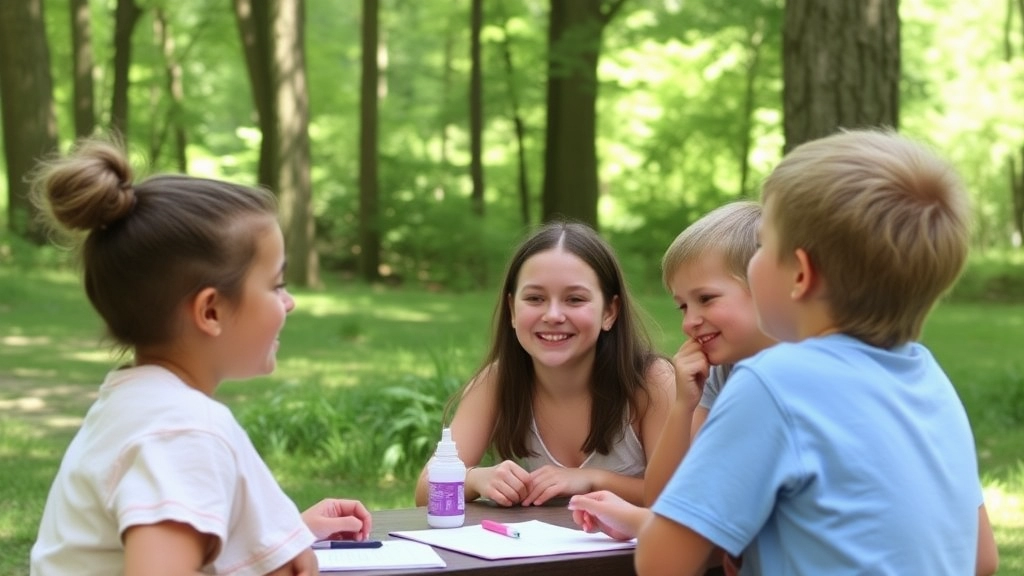
Ever wonder how summer camps handle sexual health education?
It’s a real concern for parents and campers alike.
How do we make sure our kids are informed and safe without making it awkward?
Let’s dive in.
Why Is Sexual Health Education Important?
First off, let’s get real.
Kids are curious.
Especially when they’re away from home and surrounded by peers.
Summer camps provide a unique setting for learning about relationships and boundaries.
But how do we make sure it’s done right?
What Do These Programs Look Like?
Here’s the deal.
Effective programs are straightforward and engaging.
They cover:
- Consent: Understanding and respecting boundaries.
- Safe practices: Basics of protection and health.
- Healthy relationships: Recognising what’s healthy and what’s not.
No lectures.
Just real talk.
How Do Camps Implement These Programs?
Camps often bring in experts or trained counselors to lead sessions.
They use:
- Interactive workshops: Think games and role-playing.
- Discussion groups: Safe spaces to ask questions.
- Resources: Pamphlets, videos, and more.
What Makes a Program Successful?
It’s all about connection.
Kids need to feel comfortable and heard.
So, programs should be:
- Inclusive: Covering diverse perspectives.
- Age-appropriate: Relevant for different age groups.
- Engaging: Keeping it fun and relatable.
Real Stories, Real Impact
I remember chatting with a camp counselor who shared a story.
A camper once said, “I finally get what consent means.”
That’s the kind of impact we’re aiming for.
How Can Parents Get Involved?
Parents, you’re not off the hook.
Stay in the loop:
- Ask questions: What’s being taught?
- Provide feedback: Share your thoughts with camp staff.
- Talk to your kids: Keep the conversation going at home.
Creating a Safe and Respectful Environment for Campers
Alright, let’s talk about something that’s on every parent’s mind: creating a safe and respectful environment for campers. When you’re sending your kid off to summer camp, you want to know they’re not just having fun, but they’re also in a place where they feel safe and respected. It’s a big deal, right?
Real Concerns from Real Parents
Parents often worry about a few key things:
- Safety: Will my child be physically safe?
- Respect: Will they be treated with kindness and respect by both peers and staff?
- Boundaries: Are there clear rules about personal space and consent?
These are legit concerns, and camps need to tackle them head-on. Let’s break it down.
Safety First
When it comes to safety, camps should have:
- Clear rules and guidelines: These should cover everything from physical activities to interactions between campers.
- Trained staff: Counselors and staff should be trained in first aid, conflict resolution, and emergency procedures.
- Regular check-ins: Daily check-ins with campers to ensure they’re feeling safe and comfortable.
Building Respect
Respect isn’t just a word; it’s an action. Camps can foster a respectful environment by:
- Setting expectations: From day one, make it clear that bullying, teasing, and any form of disrespect won’t be tolerated.
- Role modeling: Counselors should model respectful behavior in all their interactions.
- Open communication: Encourage campers to speak up if they feel uncomfortable or disrespected.
Understanding Boundaries
Boundaries are crucial, especially in a camp setting where kids are living in close quarters. Here’s how camps can handle this:
- Education on consent: Teach campers about the importance of consent and personal boundaries.
- Clear policies: Have clear policies about physical contact and personal space.
- Safe spaces: Create safe spaces where campers can go if they need some alone time or feel overwhelmed.
Stories from the Campfire
Let me share a quick story. Last summer, one of our campers, let’s call him Jake, was super shy and nervous. He was worried about fitting in and making friends. But thanks to our respectful and inclusive environment, he quickly found his tribe. By the end of the camp, Jake was leading group activities and had made friends for life. This is what a safe and respectful environment can do.
Wrapping Up
Creating a safe and respectful environment for campers isn’t just about rules and policies. It’s about fostering a culture where every camper feels valued and heard. When camps get this right, it transforms the entire experience.
So, next time you’re looking at summer camps, ask about their safety measures, how they handle respect and boundaries, and what kind of training their staff undergo. It’s your kid’s summer, and they deserve the best.
If you’re interested in more tips and insights, check out our guide on key elements and trends in summer camp buildings and our weekly themes for endless fun to ensure a great camp experience.
Parental Concerns and Communication with Camp Staff
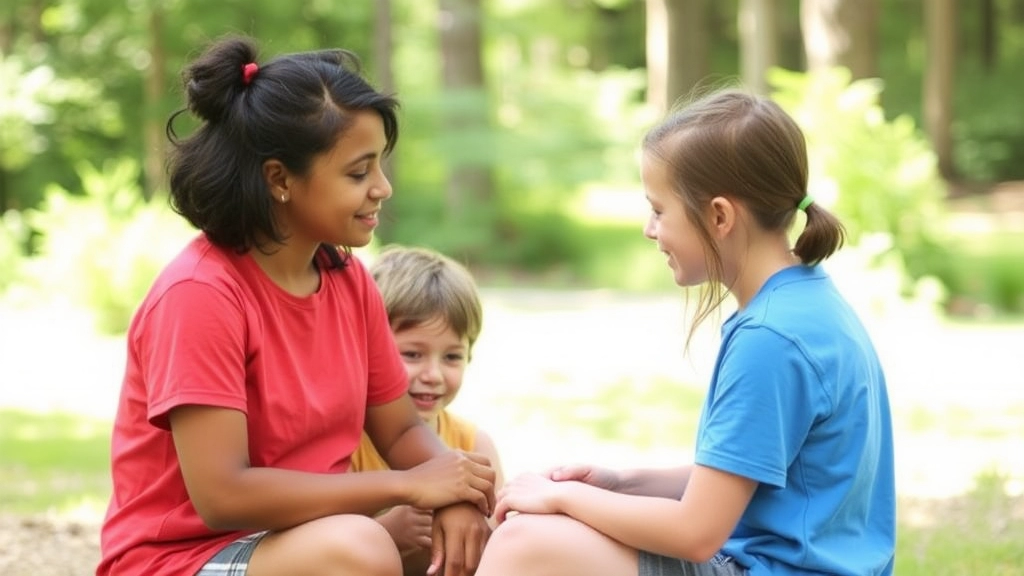
Are You Worried About Your Child at Summer Camp?
Let’s face it—sending your child to summer camp can be nerve-wracking.
You’re not just worried about whether they’ll have fun.
You’re concerned about their safety, the people they’ll meet, and the experiences they’ll have.
And that’s totally normal.
Why Communication Is Key
Open communication with camp staff can ease those worries.
Here’s how you can make it work:
- Ask Questions: Don’t hesitate to ask about safety protocols, daily schedules, and staff qualifications.
- Stay Informed: Request regular updates. Some camps offer newsletters or apps for real-time info.
- Meet the Staff: Attend pre-camp meetings or virtual sessions to get a feel for the team.
What Should You Be Asking?
Here’s a quick checklist:
- Safety Measures: What’s in place for emergencies?
- Health Protocols: How do they handle medical issues?
- Staff Training: Are counselors trained in first aid and child psychology?
- Communication Channels: How can you reach your child or the staff in a pinch?
Real Stories, Real Peace of Mind
I remember when I sent my niece to camp for the first time.
I was a bundle of nerves.
But the camp director was fantastic—she answered every question, no matter how small.
And guess what?
My niece had the time of her life.
The Bottom Line
Your peace of mind matters.
Open lines of communication with camp staff can make all the difference.
So, don’t hold back.
Ask those questions.
Stay informed.
Your child’s summer adventure should be as stress-free for you as it is fun for them.
Legal and Ethical Considerations for Summer Camps
Hey, let’s get real for a minute. When it comes to sending your kid off to summer camp, there’s a ton of stuff that can keep you up at night. One biggie? Legal and ethical concerns. Yeah, it’s not the most exciting topic, but trust me, it’s crucial. So, let’s break it down in a way that makes sense and keeps it engaging.
What Are the Legal Requirements for Summer Camps?
First off, let’s talk about the basics. Every summer camp has to follow specific laws and regulations to keep kids safe and sound. But what exactly are these rules?
- Health and Safety Regulations: Camps must adhere to local health codes, ensuring that the environment is safe and clean. This includes everything from food safety to first aid readiness. For more on nutritious food options, check out our summer camp meal ideas.
- Background Checks: All staff, especially those interacting with kids, should undergo thorough background checks. This is non-negotiable.
- Licensing: Camps usually need to be licensed by state or local authorities. This ensures they meet minimum standards for operation.
Ethical Guidelines: More Than Just Rules
Now, let’s dive into the ethical side of things. Legal requirements are the bare minimum. Ethical guidelines, however, elevate the camp experience from merely “okay” to exceptional.
- Transparency: Camps should be upfront about their policies, including how they handle bullying, discipline, and emergencies.
- Inclusivity: A good camp promotes an inclusive environment where every child feels welcome, regardless of their background. Learn more about creating an inclusive camp environment in our inclusive programs guide.
- Respect for Autonomy: This means respecting each camper’s personal space and boundaries. It’s about teaching kids to respect each other, too.
Real-Life Examples: When Things Go Right
Let me share a quick story. A friend of mine sent her daughter to a summer camp that had stellar reviews. The camp director was transparent about their policies, and the staff was well-trained in both legal and ethical standards. The result? Her daughter had an amazing time, made lifelong friends, and came back more confident. This is what happens when camps get it right.
What Can Parents Do?
So, what can you do as a parent to ensure your child’s camp is up to snuff? Here are some actionable tips:
- Ask Questions: Don’t be shy. Ask the camp director about their policies on safety, staff training, and how they handle emergencies.
- Read Reviews: Look for reviews from other parents. They can offer insights that you won’t find on the camp’s official website.
- Visit the Camp: If possible, visit the camp before signing up. This gives you a firsthand look at the facilities and staff.
Legal and Ethical Concerns: The Bottom Line
At the end of the day, sending your kid to summer camp should be a fun and enriching experience, not a source of stress. By understanding the legal and ethical considerations, you can make an informed decision that puts your mind at ease.
Resources and Support for Campers and Parents
Worried about your kid’s summer camp experience?
You’re not alone.
Many parents have the same concerns.
So, what resources and support can you count on?
Here’s the lowdown.
1. Camp Orientation Sessions
Most camps offer an orientation.
It’s your chance to meet the staff and ask questions.
2. Parent Handbooks
These are gold.
They cover everything from daily schedules to emergency procedures.
3. Open Communication Lines
Make sure the camp has a clear way to contact you.
Whether it’s a phone call, email, or even an app.
4. Trained Counselors
Counselors are trained to handle all sorts of situations.
They can be a great resource for both you and your child.
5. Mental Health Support
Some camps have mental health professionals on staff.
They can help if your child is feeling anxious or homesick.
6. Online Portals
Many camps have online portals where you can check updates and photos.
It’s a great way to stay connected.
7. Parent Communities
Join online forums or social media groups.
Other parents can be a valuable resource.
8. Feedback Mechanisms
Camps often have ways for you to give feedback.
Use them.
It helps improve the experience for everyone.
9. Legal and Ethical Guidelines
Make sure the camp follows legal and ethical guidelines.
This ensures a safe environment for your child.
10. Emergency Plans
Ask about the camp’s emergency plans.
It’s crucial to know how they handle unexpected situations.
Stories and Examples
Remember Jane, a mum from London?
She was worried about her son’s first camp.
But after attending the orientation and reading the parent handbook, she felt much more at ease.
FAQs on Summer Camps and Related Topics
What are some common misconceptions about summer camps due to media portrayal?
Movies and TV shows often depict summer camps with over-the-top pranks, romantic escapades, and unrealistic adventures. These portrayals can set up false expectations and misconceptions about what summer camps are really like.
What are summer camps actually about?
In reality, summer camps focus on learning new skills, building friendships, and growing as individuals. While there might be some pranks and crushes, they are not the main focus.
How can parents get accurate information about a summer camp?
Parents can get accurate information by talking to real campers and parents, visiting the camp beforehand if possible, reading reviews and testimonials, and asking questions about the daily schedule and activities.
Why is discussing consent and boundaries important at summer camps?
Discussing consent and boundaries is crucial because it fosters respect and understanding. It helps campers learn how to interact appropriately and ensures that everyone feels safe and respected.
How should camps talk about consent with campers?
Camps should keep the conversation simple and straightforward. Key points include asking before acting, listening and respecting when someone says “no”, and encouraging clear communication.
What are some effective ways to set boundaries at camp?
Effective ways to set boundaries include respecting personal space, ensuring physical touch is consensual, and maintaining privacy by knocking before entering cabins.
What role do camp counselors play in maintaining consent and boundaries?
Camp counselors should lead by example, create an open dialogue for campers to express concerns, and intervene when needed to uphold boundaries.
Why is sexual health education important at summer camps?
Sexual health education is important because it helps campers understand consent, practice safe behaviors, and recognize healthy relationships. It provides essential knowledge in a setting where kids are naturally curious.
What do effective sexual health education programs at camps look like?
Effective programs are straightforward and engaging, covering topics like consent, safe practices, and healthy relationships through interactive workshops, discussion groups, and various resources.
How can parents ensure their child receives proper sexual health education at camp?
Parents can stay involved by asking questions about the curriculum, providing feedback to camp staff, and continuing the conversation at home.
What are some key questions parents should ask camp staff?
Parents should ask about safety measures, health protocols, staff training, and communication channels to ensure their child’s well-being at camp.
How can open communication with camp staff ease parental concerns?
Open communication can provide reassurance about safety protocols, daily schedules, and staff qualifications. Regular updates and meeting the staff can also help parents feel more at ease.
References
-
Communication Tips for Parents
-
Talking to Kids About Consent and Boundaries
-
Sexual Health Education

